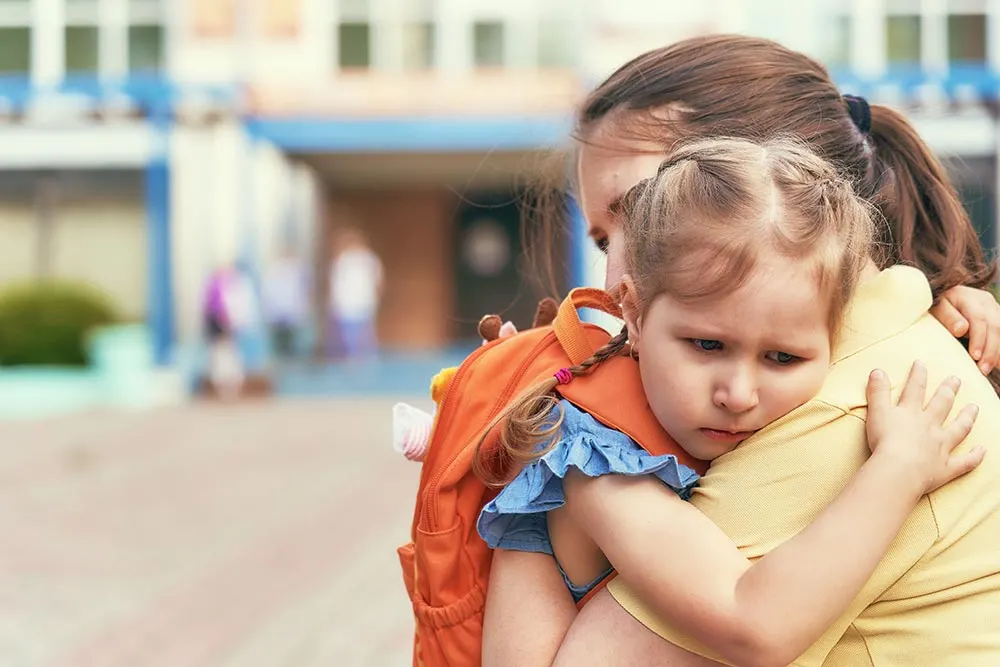For children who don’t like separation, the daily drop-off can be challenging. Follow these tips to ease school anxiety in daycare, preschool, and elementary-aged kids.
“I don’t want to go to school!” It’s an age-old complaint from children, but a growing body of research suggests that it can signal a deeper problem: school anxiety. This fear affects 2 to 5% of school-age children, according to the Anxiety and Depression Association of America (ADAA). And the pandemic certainly didn’t make things easier, with disruptions to routine, perhaps more time at home with caregivers, and an undercurrent of fear for both children and adults.
School Anxiety in Daycare
If you’re dealing with anxiety, tears, and fears at daycare drop-off, it can be incredibly challenging to deal with—and set your entire day off with stress. Here are some things to know about what might be behind the tears at dropoff and how to cope.
Causes of daycare anxiety
Around 8 months, many children develop separation anxiety, which causes them to scream and cry whenever their caregiver isn’t around. This anxiety coincides with a new intellectual skill called object permanence: the ability to remember objects and specific people that aren’t present, according to pediatrician Alan Greene, M.D., FAAP. In other words, your baby starts calling up mental pictures of you when you aren’t there—and they miss your warmth, comfort, and familiarity. Young children also don’t have a sense of time, so they don’t understand whether you’ll be gone for an hour or two days.
What daycare anxiety might look like
Babies and toddlers may scream and cling during drop-off—but they’ll usually stop once you’re out of sight.
How to handle it
Dr. Greene suggests preparing your child with “separation” games, such as peek-a-boo, which reinforce that you’ll always return after leaving. You can also begin introducing small doses of separation into your little one’s life—a visit to an aunt’s house or a day with a grandparent. According to Elizabeth Berger, M.D., a child and adolescent psychiatrist, “Little by little, your child will become more comfortable with spending time away with you, because they’ll know that you will return when you said that you would. They’ll also know they had a good time even when you were gone.”
When it’s time for daycare drop-off, “goodbyes should be brief, affectionate, and with a clear statement that you will be back,” Dr. Greene says. Don’t draw out the leaving process, since it can make the experience more traumatic for a child. Also, avoid sneaking out without saying goodbye; your little one might feel that they can’t trust you. In some cases, switching up the caregiver who does drop-off might help. (For instance, my daughter clings to my neck and cries when I drop her off, but happily waves to my husband without a glance back.) Finally, Dr. Greene suggests bringing a stuffed animal, blanket, or another comforting object to the daycare center.
School Anxiety in Preschoolers
You might have imagined that preschool would be thrilling for your child—only to deal with a lot of resistance. The good news is, this can be normal and there are some steps that might help.
Causes of preschool anxiety
“School” is an abstract concept to a kid who’s never been before. The unfamiliar people and routines can be scary for them. Some preschoolers might also have lingering separation anxiety, but this is completely normal—it simply means that a child has a strong attachment to a caregiver.
What preschool anxiety might look like?
Usually, kids with school anxiety will show a range of stress- or anxiety-related symptoms. Preschoolers might talk about their fear of school and ask for repeated reassurance: “Can you stay at school with me?” “Do I have to go?” They may also complain about stomachaches or headaches, or they’ll throw tantrums when you’re ready to leave.
How to handle it?
If your child is going into preschool, take them on a tour a few days beforehand, recommends Sucheta Connolly, M.D., a child psychiatrist and director of the Pediatric Stress and Anxiety Disorders Clinic at the University of Illinois in Chicago, which treats children as young as two. Talk openly and excitedly to your child about their upcoming routine. If they tend to have trouble with new social situations, arrange for playdates with some new classmates before school begins.
Also consider role-playing at home. Many children are cognitively ready for school but struggle to assert themselves socially. Use puppets, dolls, or stuffed animals to act out social situations that make them anxious, such as meeting the teacher for the first time.
When the first day comes, it’s sometimes best to tell your child that you will stay for a few minutes to help them feel settled. Give them a little memento to put in their pocket that reminds them of you, so they can take it out if they feel sad. If you think the problem is serious, you might speak privately with the teacher. Many children are a bit weepy at first, but most of them cheer up in a few minutes.
You can also reward children for taking positive steps toward independence. For example, put a sticker on your kid’s chart every day they attend school without tears or clinging, and when they earn a certain number of stickers, take them on a special outing.
School Anxiety in Elementary Students
Just when you think your child may be getting comfortable leaving you, a new anxiety sets in. What gives? Separation anxiety at school can set in even if your child has had no problem leaving before.
Causes of school anxiety
School anxiety in elementary students has many different causes. For starters, the child might be stressed by the demands of the classroom. “Our society is expecting more and more from our kids at younger ages,” says Dr. Connolly. “And not all of them can handle it.”
Along those lines, the student may have undiagnosed learning disability, adds Dr. Connolly. If they have difficulty with a certain subject—but the teachers aren’t aware or think the student simply isn’t trying—the kid can fret about school.
Other factors, including generalized anxiety disorder (GAD) and social anxiety, can also make school seem scary. Children with GAD suffer excessive worry about everyday things—academic performance, being away from parents, etc. Kids with social anxiety often feel intensely scrutinized and worry that they’ll do something embarrassing. Some are fearful of speaking in front of the class, while others have trouble even walking up to the blackboard.
What school anxiety might look like?
Children might have physical symptoms (headaches, nausea, diarrhea, difficulty sleeping, etc.) that appear before the school day, according to the ADAA. Some will develop school refusal—a fear so intense that they can’t be coaxed into the school bus or the building. If they manage to get to school, they may cry, complain of aches and pains, and can’t be consoled by the teacher.
It’s important to note that children with school anxiety struggle every day of school. It’s not something they have one day but not the next.
How to handle it?
Always have recurrent physical symptoms checked out by a pediatrician to rule out medical problems. But assuming kids are physically healthy, try to explore their feelings and emotion together. Acknowledge that they feel scared, but reiterate that nervousness doesn’t mean they won’t enjoy themselves. Remind them of new situations they’ve dealt with, such as sleeping at Grandma’s house for the first time without you, and how it ended up fine.
It’s also important to rule out problems at school or home. Ask your child and their teacher if something upsetting happened, such as bullying or teasing. Events at home—a move, a divorce, the death of a family pet, etc.—might also be causing these negative feelings. Dealing with these issues accordingly might relieve some negative symptoms.
If the school anxiety doesn’t ease for several weeks, or if it affects your child’s everyday life, have them evaluated by a mental health professional who specializes in working with kids. School anxiety is not a psychiatric diagnosis, but it may be a symptom of an anxiety disorder. Treatment usually begins with cognitive behavioral therapy, which teaches relaxation and coping skills and can result in improved behavior over several months. Doctors may also prescribe medication for severe cases. Work with the expert and your child’s teacher to help your child feel more comfortable in the classroom.






















Pingback: What To Do When Kids Forget Things At School? - Fajar Magazine